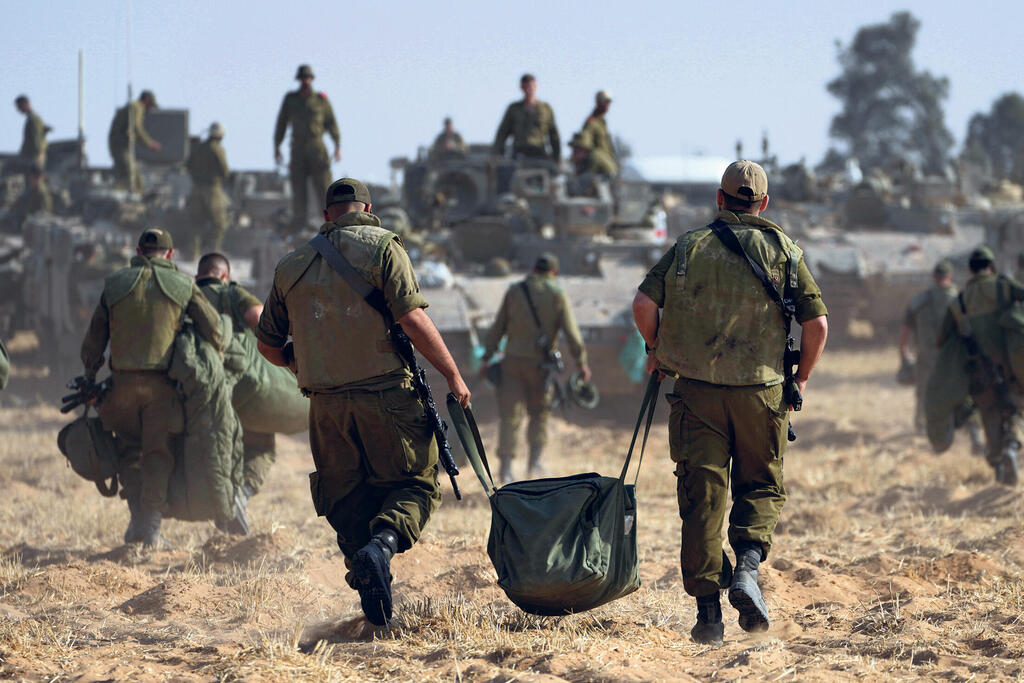
Caught between duty and career: How Israeli reservists are facing tough choices
Despite legal protections, extended reserve duty is causing job losses, stalled promotions, and stunted careers.
Two months ago, after his third reserve stint lasting three months in Gaza, Y., who requested anonymity, decided to resign from the job he had held for five years. “The boss kind of showed me the door. He wasn’t happy that I wasn’t available five working days a week after I did 220 reserve duty days in the past year,” he says.
Y. serves in a role that allows for a mix of work and reserve duty at an open base where he’s required to work three to four shifts a week. He previously worked in customer success (CS) at a high-tech company. “I am a reservist with the privilege of being able to work simultaneously, but in jobs like mine, over a period of three or four months, you can’t deliver the required output or customer availability for the position. Eventually, they started taking me off projects. They didn’t want me to come to work while I was in the reserves but rather just sit at home, even though I could still work. After my reserve stint, they assigned me minor tasks to pass the day, which led me to resign. I also couldn’t get raises or other benefits, and my boss told me I hadn’t performed well over the past year. How could I show results if they wouldn’t let me work?” he says. He was told that his lack of full availability for clients was incompatible with project demands.
Although the law prohibits firing reservists due to their reserve duty for up to a month after returning to work (except with approval from the Ministry of Defense's employment committee), it does not protect against being removed from new projects, denied raises, or passed over for promotions.
This dismissal protection was expanded after the October 7th war: if an employee serves in the reserves for at least 60 days between October 7, 2023, and the end of 2024, they may not be fired for 60 days following the end of their service. However, this protection only applies to layoffs, and employers can bypass it by getting committee approval.
To comply with legal requirements, Y.'s employer didn’t fire him outright but conveyed their dissatisfaction with his performance over the past year, which he felt was a veiled way of pushing him out.
Currently back on reserve duty, Y. is also job hunting. In interviews, he doesn’t disclose that he’s a reservist with significant reserve duty, revealing this only at an advanced stage of the interview process. “I also avoid mentioning that my last job ended because of my reserve duty,” he says.
For reservists, the burden this past year has been enormous, making it almost impossible to maintain a career without workplace support. Many experience setbacks such as delayed raises, missed promotions, and lack of access to new projects. This strain extends to employers as well. Even when trying to support reservists, businesses must weigh continuity. Employers often prioritize employees available five days a week for key projects, leaving reservists with limited opportunities. Reservist employees who spend months on standby feel unable to request raises or career-advancing projects, knowing they can’t guarantee their availability.
A., a software engineer at a major tech company who has served over 200 reserve days this year, describes the difficulty of dealing with uncertainty. “As a senior engineer, I’m expected to lead projects from start to finish and liaise with teams abroad. If I’m called up for a month or more, I can get back into work mode, but my reserve duty is often for just one to three weeks, sometimes last-minute. It’s hard to plan ahead, and it affects both my projects and those I work with. My company is big enough to ‘absorb’ the impact of my irregular schedule, and my manager is very understanding. But being away from work for much of the year directly impacts my promotion track and my performance rating,” he says.
N., another reservist, recalls his own challenges: “I had a salary increase planned, took the required tests, and then on October 7, I was drafted. That halted the increase, so during my reserve service, I earned 10% less,” says N., who worked as a mechanical engineer in his first post-graduate job. After his first reserve duty ended in March, he returned to work, only to be laid off in April.
“They told me everything was fine while I was in the reserves—‘just focus on your duty.’ But the company collapsed because so many of us were called up. The VP was also away, and a lot of things just stopped. I’m not the only one in my team who was fired. I filed a claim with the IDF association for wrongful termination, but I keep getting called up. I started looking for a job in May, got called up again in July for what was supposed to be 30 days that turned into 60, and after that, I was called up again on October 7. I had a job interview where I was told, ‘Get out of the reserves and come talk to me, because I need someone now.’” He remains in the reserves, searching for work as a mechanical engineer. “I’m on standby—I may return to duty tomorrow, next week. I’m in the dark,” he says.
R., a development manager who was laid off two weeks into his first reserve stint after October 7 when his company went bankrupt, faced months of job-seeking delays. “Everything was stalled. It’s difficult to schedule interviews when you’re on duty for weeks at a time. Even when I found companies hiring, senior managers were also in the reserves.”
“It’s impossible to manage a career and reserves for long periods,” R. adds. While job-hunting, he provided remote consulting and now works as a development manager in biomed. “Before I started, my manager asked that I not ‘run off’ to the reserves for too long. During my last round of service, I declined an extension, saying, ‘I’m not jeopardizing my livelihood.’ You can’t balance a career and long-term reserve duty—it just doesn’t work.”
The reservists’ career struggles are expected to continue, as the security system plans for over 100 days of reserve duty next year. Reservists employed before the war are in a better position than those entering the labor market for the first time.
Recruiter Rotem Bezalel started the “Duty to Desk” project to help reservists find work. “I decided to post one person’s profile a day in uniform, detailing their background and goals. The project went viral, and people started getting job offers,” Bezalel says. Those who finally secure a position then face further disruptions when called back to duty. “Instead of putting all their energy into a new opportunity, they’re back in the reserves, anxious about their safety and the opportunity they’ve been given. They know the market is full of people eager to get in, so they’re very afraid of losing their place,” he says.














